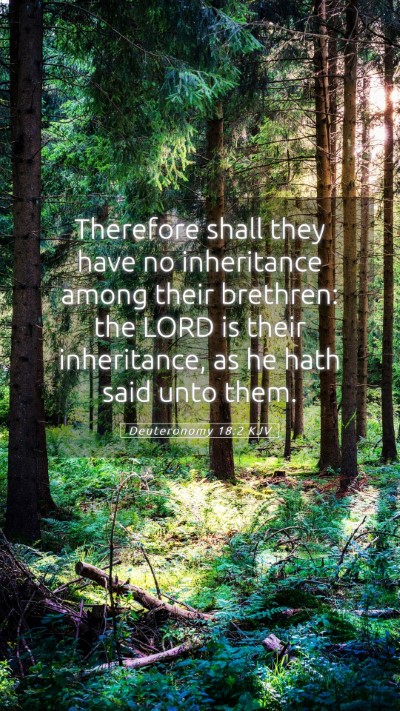Understanding Deuteronomy 18:2: A Comprehensive Commentary
Deuteronomy 18:2 states: "Therefore shall they have no inheritance among their brethren: the Lord is their inheritance, as he hath said unto them." This verse serves a critical role in understanding the unique position of the Levites among the tribes of Israel. Here, we offer a detailed examination and interpretation of this verse utilizing insights from esteemed public domain commentaries such as those by Matthew Henry, Albert Barnes, and Adam Clarke.
Bible Verse Meanings
This passage emphasizes the special status of the Levitical priesthood. The Levites were set apart from the other tribes of Israel, not receiving a typical portion of land but rather inheriting the Lord Himself. They were devoted to the service of God, carrying out duties associated with the tabernacle and later the temple. The absence of a physical inheritance illustrates a profound principle: their work and status find complete fulfillment in God’s presence.
Bible Verse Interpretations
- Matthew Henry's Commentary: Matthew Henry describes the Levites as dedicated servants whose relationship with God surpasses worldly possessions. They were wholly devoted to the service of God, indicating that true inheritance is divine fellowship.
- Albert Barnes' Notes: Barnes highlights that the Levites' role was essential as mediators between God and the people of Israel. This verse signifies their privilege and the spiritual inheritance, emphasizing that God Himself is their reward.
- Adam Clarke's Commentary: Clarke points to the idea that the Levites were entrusted with the sacred duties of worship, underscoring that their calling was unique and that their sustenance came through the offerings made to God, demonstrating reliance on divine provision.
Bible Verse Understanding
The understanding of Deuteronomy 18:2 is deepened by recognizing the broader context of the Levitical priesthood. They were not just religious functionaries; they represented God’s presence among the people. In this regard, their lack of a physical inheritance reflects a commitment to spiritual riches that influences believers today in prioritizing their relationship with God over material gains.
Bible Verse Explanations
In explaining this verse, several key ideas emerge:
- The Levites' unique position serves as a reminder that all believers are called to a life of service.
- The concept of God as the ultimate inheritance encourages a deeper pursuit of spiritual growth and divine connection.
- This passage also affirms God’s provision, emphasizing that those who serve Him will have their needs met.
Historical Context of the Priestly Role
Understanding the historical context of Deuteronomy 18:2 reveals insights into ancient Israelite culture. The tribe of Levi was chosen to fulfill the sacred responsibilities of worship, indicating that spiritual leadership was essential for maintaining the covenant relationship between God and His people. This dedication to God rather than land cultivation or inheritance marks a significant distinction in Old Testament priestly practices.
In-depth Bible Verse Analysis
This verse should be viewed through the lens of in-depth biblical exegesis, which reveals the multifaceted nature of the Levitical call. The priestly role involved teaching the law, mentoring the community, and leading worship. Thus, their commitment to their divine calling far outweighed any physical or material concerns.
Applying Bible Verses to Daily Life
The implications of this verse for contemporary believers are profound. Just as the Levites dedicated their lives to service, modern believers are encouraged to seek fulfillment in their relationship with God, engaging in service to others and finding their needs met through God’s provision.
Significance of Deuteronomy 18:2
The significance of this passage extends beyond its immediate historical context to shape Christian understandings of ministry and service. It reinforces the notion that serving God should be pursued with zeal, and spiritual inheritance is considered more valuable than worldly possessions.
Cross References
- Numbers 18:20-24: Discusses the Levites' inheritance, reinforcing the idea of God as their portion.
- Deuteronomy 10:9: Affirms that the Levites have no share in the land, emphasizing their unique role.
- Psalm 16:5-6: Illustrates the theme of God as the believer's inheritance.
Conclusion
In summary, Deuteronomy 18:2 is a rich source for spiritual reflection and understanding. The insights drawn from renowned biblical commentaries help to elucidate the underlying principles that continue to resonate with believers today. This passage inspires believers to embrace their calling, seeking deeper communion with God as their ultimate inheritance.


